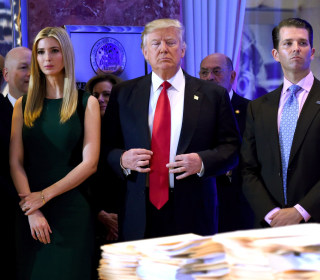I need to start this by pointing out one of the prominent contradictions of Capitalism today: On the one hand it has always keen about the idea that production should always specialize where it is most efficient; where efficiency is usually meant to be the best bang for the buck. In this regard, as we have already seen, the Big Money interests of opening markets, and most especially labor markets, with the ability to trade back with goods made from cheaper labor, has been made manifest in NAFTA, and the TPP, as well as the World Trade Organization.
A big part of what is going on here, certainly, is that Big Money, and those who control it, have no real nationality (see the fictional manifestations of this in the books by Daniel Suarez: Daemon, Freedom, and Kill Decision) any more. The only criteria that matters in this mindset is where are the best profits to be made, and how can we make them.
Another, more traditionally nationalist, if still quite practical, view is the one that worries about national viability if you don't actually produce much of anything related to core productive capability any more. This view is getting repeated a good deal more in recent years precisely as China has been able to take advantage of the favorable trade imbalance cheaper labor (among other things) has given it; at least until the last year or two (and for which they surely see slipping away now). You can hear this view repeated quite well by John J. Tkacik, Jr. (Former Diplomat -- China, Taiwan, Ex Head of the China Information Bureau, State Department -- Washington DC -- From Documentary 2017 - World War 3 USA vs CHINA - BBC Documentary 2017, Timestamp 45:01 ):
"...The United States cannot maintain itself as a superpower if we allow our industrial production to be... to be offshored...to be outsourced... And that's what's happening now... we're finding very large amounts of our basic... core industries. And I don't just mean like steel, steel is just one of them... copper, you know, basic resources, but things like semi conductors... and when we find that our semi conductor industry has gone from 12, you know, state of the art wafer fabs, to three, um because more and more are being built in Taiwan, Japan.. well not in Japan, in South Korea, and in China. If we're allowing our, you know, state of the art, cutting edge, electronic science and technology, research and development, to move to China... we can't survive as a superpower."
That both groups would still claim to be true torch bearers for Capitalism is nearly as contradictory as what either means when it claims to define what a "superpower" is, or can be, any more. On the one hand it is capital flow itself (which, also contradictory, must necessarily include information) that is the superpower, and on the other it is competitive nation states, vying for both resources, and market control, that is the true superpower.
The problem, however, is that neither can have what they feel is the true definition of Capitalism, or continued "Superpower" status for that matter. This is so because information will never be truly free flowing (which is why so much effort is put into stealing it, and why the thieves will always be one step ahead of the hoarders) as long as it exists under the commodity constraint of "net gain" for the "Big Money" side And for the traditional nationalists you can't preserve jobs, in Capitalist economic sense at least, just because they contribute to "national power."
There is, certainly, a perhaps much greater constraint on the old notion of superpower: the very simple notion that now, with resources so constrained, and climate change so increasingly extreme, that such old exercises to establish such dominance are nothing more than pissing matches conducted on the lower decks of the Titanic as it encounters the first ripping shudders of a very rude awakening. In this context the only superpower that ought to matter anymore is the degree to which we can find ways to cooperate with each other; either to slow climate change down, and/or deal with the collateral damage, that is inevitable now, as best we can.
I do want to get back to the videos I've featured here, though, because, like it or not, this has been a big part of the foundation for Trump giving lip service to starting trade wars with the Chinese, and pretending, in the interim, that bluster will save the day when it comes to preventing actual armed hostilities.
These are, to say the least, very effective sets of advocacy (I really hesitate to call them propaganda precisely because I can relate to the populist ethos they stem in significant part from), even given the degree to which they stoop to pandering to nationalistic pride, and ego. There are very real issues here, but there is also a profound tendency to oversimplify complex considerations.
China has, obviously, benefited greatly by trade imbalances; restricting their markets even as we open ours; playing fast and loose with their currency to keep their trade surpluses going, etc. And just as obviously, the American middle class worker has not benefited nearly as much. We also, however, get China portrayed as an unstoppable economic juggernaut (without very serious problems of it's own which could actually bring the current government down, and the rest of the country into unbelievable chaos), just as Japan used to be portrayed when we thought they would end up owning all of America, and winning WW 2 after all.
We also get China's military presented as the equal to ours, which it isn't, even if there are certain vulnerabilities that we should always be wary of (like the new diesel, or fuel cell powered, subs; satellite vulnerabilities, spectrum vulnerabilities; or strategic missiles that can target our carriers).
Now that resources are getting more scarce. Now that Taiwan is even more of a thorn in their side, and jobs are still not very easy to provide, what do we do? And in that, it seems to me, the one thing we cannot do is business as usual. We have to keep a balanced view of the context, avoiding power vacuums just as much as sabre rattling, even as we work to create a new interactive dynamic.
Let's be clear. If the roles were reversed. If, say, the French (however surreptitiously, or not) helped the south to hold on to, say, Florida, after they lost the civil war, keeping Jefferson Davis's government alive; how do you think we would feel about it even only, say fifty years after it was all over. Obviously the Chinese want an undisputedly singular nation; and both for very real reasons of a strategic, and national pride nature. The fact is, however, regardless of how illegitimate the beginnings of the Taiwan state may have been, there are facts on the ground now that we simply cannot turn away from. The question then becomes how do you finess not abandoning, but also not explicitly recognizing, those facts?
One way, of course, is to grant concessions in one sphere as you also withhold them in others. And in this our willingness to bend financially might be seen as one form of payment. The fact remains, however, that you don't give in to easy bluster just because it gets you votes, or because it begs deeper financial questions. You resist the former outright as obviously counter productive, and you look to new alternatives to address the deeper financial questions. You also look for new ways to offer incentives, as concessions, that also happen to offer real solutions to common problems; of which both countries have plenty (hence the hydrogen energy initiatives I've suggested using sea based Tornado Turbines).
Let us also not forget that the same contradictions inherent in Capitalism, that plague us, will be plaguing them as well, and perhaps more severely as they have a far more vast disadvantaged groups of people than we will ever have. Groups that not only still struggle against poverty, but also the deep insults of corruption, environmental insult, and degradation that make our events of poisoning, or flooding, or mine disaster, look tame in comparison.
The bottom line here is that we, and the rest of the world, desperately needs a new way of conduction interaction with other nation states; one that can at least eliminate the competition for markets, as it also seeks to minimize the competition for resources, because this is the only way we can ease the prime pressures that put us into conflict scenarios in the first place. And this needs to start with one nation taking the lead in that change, phasing out the old cost based economics with the new effort based one. A phasing that, one would hope, could be done so that other, less developed nations could step in to take our place consumption wise (at least for a while to get their level of material well being up to change as well).
This will be doubly difficult because we will still need to maintain a very strong military regardless of what we ultimately change to because a power vacuum is just as bad as power belligerence, and unjust unilateralism. The hope here would be that we could protect ourselves at least as capably, and a great deal more efficiently, as we use universal service, a military streamlined to no more than three service groups (Fleet, Mobile Infantry, and a national event response force -- combining the Core of Engineers with disaster relief responsibilities), and a command structure we can count on to prioritize defense needs on actual circumstances, as opposed to juicy contracts, and/or career opportunities after you leave uniform.
As I said, though, that is the hope. Making it happen will require a will and commitment at least equal to, if not more than, the commitment and effort we put into winning WW 2. No small thing to say the least. Can we do it? I honestly don't know. Not any more in any case. That being said, however, doesn't change the other side of the coin for that question: Can we afford to do nothing? Do we simply accept that war is inevitable. Even as ultimate environmental destruction is inevitable? I sure hope not. However improbable the odds are, at least in trying there is still a chance we could pull it off. Bad as those odds are they are better than what's in store for the current state of affairs.
Documentary 2017 - Documentary 2017 - Crouching Tiger Part 1: Will There Be War With China
Documentary 2017 - USA Death By China 2017| How America Lost Its Manufacturing Base (Official Version)
Documentary 2017 - World War 3 USA vs CHINA - BBC Documentary 2017

























